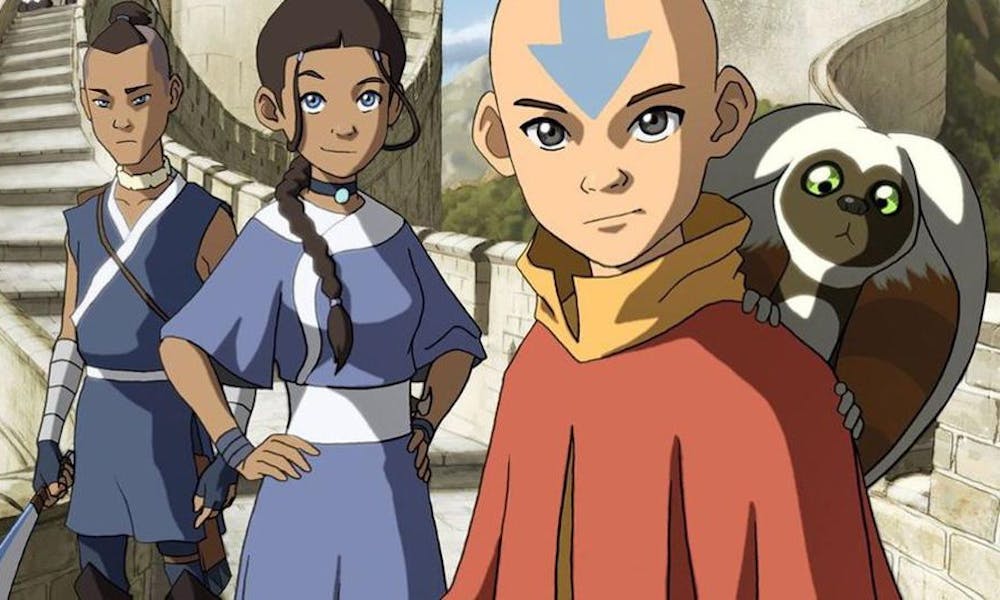When “Avatar: The Last Airbender” first aired on Nickelodeon in 2005, George W. Bush had just begun his second term in office, Mario’s “Let Me Love You” was the most popular song on the Billboard Hot 100 and YouTube was less than a week into sharing videos to the world. Fifteen years later, all sixty-one episodes of “Avatar: The Last Airbender” dropped on Netflix June 15, and the show is now more popular than ever.
Much like Eliza Thornberry or Jimmy Neutron, the sight of Aang and his tattooed head inspires nostalgia among millennials and zoomers. Yet, the significance and acclaim of the series makes it suitable for rewatching among all ages, even today. The childhood appeal of “Avatar: The Last Airbender” is obvious: the rapid succession of martial arts-styled moves which constitutes the "bending" of natural elements is, in itself, enough to produce great content. For those less interested in combat, the show incorporates plenty of humor, thoughtful conversation and detailed creativity. The creativity especially shines when it comes to the animals specific to the show — where else can one watch a majestic ten-ton sky bison effortlessly soar through the air?
The show's nullification of standard source material made it accessible to all demographics. Whereas many popular television sitcoms cater to a white, suburban experience and capitalize on racial stereotypes for weak humor, each nation’s culture derives from non-Western settings: the Fire Nation is associated with Japan, Earth Kingdom with China, Water Tribes with the Inuit peoples and Air Nomads with Tibet. This permeates into each nation’s architecture, clothing and decorum.
“Avatar: The Last Airbender” also promotes gender equality at every turn, a refreshing break from action stories’ typical reduction of women into objects of romantic fascination and side commentary. In the series, women are spirited warriors. Perhaps the greatest indication of the show’s ability to empower women is through Sokka, a non-bender warrior with mysoginistic tendencies who often feels helpless when he cannot contribute to the battle. Although he begins the series as a boorish oaf who believes that a man’s duty is to protect "feeble" women, he eventually falls in love with Suki, a Kyoshi warrior who epitomizes the inherent strength in femininity.
Beyond the show’s patent progressivism, what has made “Avatar” so endearing fifteen years later is its relevance to real life. Although bending itself is obviously a fantastical feat, the issues that the characters grapple with emerge in our world as well. Destiny is imposed upon both Aang and Zuko, and each struggles to rectify this path with their own inner turmoil. In a particularly poignant scene from the penultimate episode, previous incarnations of the Avatar appear to Aang, urging him to kill the archvillain, Firelord Ozai, even though to end another’s life absconds from the teachings of the peaceful Air Nomads. Similarly, Zuko’s fate to become the Fire Lord could have entailed rage and destruction — qualities both his father and sister revered and encouraged — yet he strove valiantly to discover another path.
In this way, we too are facing an existential question: what does it mean to be yourself, in spite of what others expect of you? What responsibilities and obligations does that create? The show tackles those questions directly and provides a stunning revelation: we ultimately have the freedom to chart our own destiny. “Avatar: The Last Airbender” appreciates that satiating liberation from imposed destinies and identities. Anyone can change, and to allow prior faults and shortcomings to define yourself is to live inauthentically. Hopefully, the next generation of viewers will be able to glean these lessons and more from perhaps one of the greatest children’s television shows of the 2000s.
Get The Chronicle straight to your inbox
Signup for our weekly newsletter. Cancel at any time.

